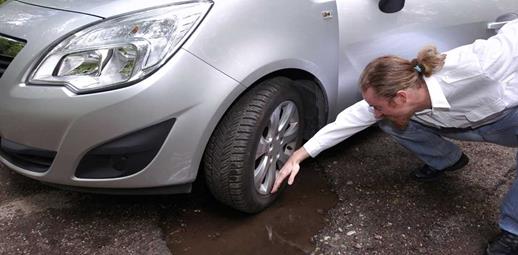
Local councils in England and Wales fill a pothole every 16 seconds, yet it would still take 15 years to restore our roads to a decent condition. Meanwhile, in Scotland, potholes surged by 50% from 2022 to 2023 [1], and Northern Ireland saw a 9% increase [2].
So, if you’ve already fallen victim to pothole damage to your car, you’re not alone. The annual ALARM survey, published by the Asphalt Industry Alliance (AIA) in March states over 50% of England and Wales’s local road network may deteriorate in the next 15 years due to a record-high backlog of repairs [3].
Has your vehicle been damaged by a pothole? Here’s your next move to claim for pothole damage.
EASY AS HACK
To claim compensation for pothole damage, take photos of the car and the pothole immediately. Your claim may fail if you can’t show the council is liable, e.g. it repairs the hole before you get evidence [4].
At a glance
|
Take these steps if you hit a pothole:
|
what is a pothole?
Potholes are holes in the road that form when water gets through cracks in the surface [5]. The hole worsens when temperatures freeze and thaw. The causes behind potholes include poor road construction and maintenance, more traffic than the surface can take, and filling in and patching when the road needs reconstruction.
1. What damage can hitting a pothole cause?
In 2023, the AA responded to 631,852 pothole-related incidents [6]. The most frequent damage from potholes is to tyres, including punctures, blowouts and sidewall bulges.
Other damage typically caused by hitting a pothole includes:
- Damaged shock absorbers
- Broken suspension springs
- Misaligned suspension
- Distorted wheels
- Steering damage
- Fluid leaks
- Exhaust damage
Potholes can damage cars. However, they can cause injury or even death to pedal cyclists and motorbike riders [7].
2. What should you do if you hit a pothole?
If you hit a pothole, here’s what you should do:
Check for damage as soon as possible
If it’s safe, pull over to the side of the road or the motorway hard shoulder and assess the damage.
It’s against the law to walk on a motorway or revisit the pothole [8] to photograph it.
Take some notes and photos
Note the pothole’s location, depth and size, the time the damage happened, and the weather and traffic conditions. What3words.com can help you identify your exact location.
Ask witnesses for their contact details to provide what they saw in writing. Your goal is to prove the pothole is responsible for the damage.
Take photos of the pothole:
- Use a tape measure or ruler to measure its depth and size or anything handy that shows the pothole’s scale (like a water bottle).
- Take pictures from a distance to show the surroundings [9].
- Photograph serial numbers on nearby telegraph poles and streetlights.
- Get photos of the damage to the car.
- Sketch a diagram showing the pothole’s location (e.g. in the middle or kerbside).
- Zoom in on Google Earth [10] to see if it has an image of the pothole.
- If you don’t have a mobile, return when the road is quiet to take the photos (except on motorways).
Take your car to a mechanic if you have any concerns
If your steering wheel vibrates or a pothole has damaged the car’s tyres, it may affect how the vehicle drives. Take it to your garage and ask them to check for pothole damage.
Check what council is responsible for that road
Local councils must keep local roads safe by law. Which roads are their responsibility are often listed on their websites. Other highway agencies are responsible for A roads and motorways. Find who to contact.
Report the pothole
Don’t let others suffer the same pothole hassle as you did. If you report the pothole to the relevant agency as soon as possible, it benefits everyone. Usually, that’s a council. They will tell you how to report a pothole online. You can also report a local problem and see if others have reported it on FixMyStreet.com
Repair your car
Keep any receipts from repairs and ask your garage to put in writing that a pothole caused the damage. Remember that some damage may only become apparent when time has passed. You won’t get the complete cost of the repair back if the pothole worsens an existing issue.
Make your claim
To claim compensation for pothole damage, contact the council responsible for the road and tell them about the damage and why you think they are accountable. They’ll want to know where the pothole was and the date and time you say it caused the damage.
3. Who is responsible for potholes in the road?
Local councils are responsible for potholes on most roads. You can learn which council maintains your road by entering your postcode on the gov.uk website to report potholes. If the road is in Greater London, check whether it’s a red route managed by Transport for London.
The gov.uk website also includes details of highway agencies where you can report a pothole on a motorway or A-road in England, Scotland and Northern Ireland.
Parts 41 to 58 of the Highways Act 1980 law explain the responsibilities of the people in charge of roads in England. In Scotland, the information is in Part 1 of the Roads (Scotland) Act 1984. It is in Article 8 of the Roads (Northern Ireland) Order 1993 in Northern Ireland.
Section 58 of the Highways Act provides a defence for councils in England and Wales if they can show they took reasonable care to secure the road and it didn’t cause danger to traffic.
The Section 58 defence includes:
(d) whether the highway council knew, or could reasonably have been expected to know, that the condition of the part of the highway to which the action relates was likely to cause danger to users of the highway
So, your chances of a successful claim on pothole damage are higher if others have also reported it, and you can prove it ignored its duties consistently.
4. Who should you contact to claim for damage caused by a pothole?
The 2 main ways to claim for pothole damage are from the council or your insurer, you cannot claim from both.
First, see if your situation qualifies:
- The pothole must be at least 40mm deep and 75mm wide in two directions [11].
- You can prove that the pothole caused the damage
- Evidence shows that the pothole existed, e.g. someone had previously reported it, or the council’s road inspections picked it up
- You were not driving dangerously (e.g. speeding)
- Your car wasn’t in disrepair (e.g. the tyres were in poor condition)
You must do some homework to find out more about the history of the road and the pothole to support your pothole damage claim.
5. How to claim for pothole damage from the council
1. Go to the council’s website
Each council has different procedures for claiming compensation. Follow their pothole claims procedure; some will allow a fast claim, while others will require a full claim. Some send you a form to fill out. Others will provide it online.
Find out what council to contact on the gov.uk website.
2. Add your evidence – if the relevant agency asks for evidence, send everything from the garage invoices to pictures of the pothole. See the complete list in Take some notes and photos.
3. Tell your story – explain what happened, the vehicle you were driving, where you hit the pothole, the damage it caused and the evidence you’re presenting [12].
Full claim [12]
To make a full claim, you need a Freedom of Information request to get the following information from the council. The information should cover the 2 years before the date the pothole damaged your vehicle:
- Ask for all inspection logs that show how it maintained the road.
- The council’s policy for inspecting and repairing its roads (to learn how often it fixes them and how the repair process works).
Review the data to ascertain if the council followed its road maintenance policy. You should review things like:
- How it performed road safety inspections.
- Whether the road had a history of problems.
- Every defect on that road in the past 2 years.
- The complaints and queries the council received.
- The action it took if someone reported the pothole.
You may also find that other citizens have reported the pothole on the independent website FixMyStreet.
Gather any evidence requested, including:
- Quotes you received to do the repairs.
- Copies of repair invoices and proof of payment.
- Copies of your mechanic’s statement on the cause of damage.
- A note (or map) of the pothole’s location.
- The date and time the damage occurred.
- Photos of the damage and the pothole, if possible.
- Notes from anyone who saw the incident.
Write a letter listing all the discrepancies between what the council should do and what they did. You can learn what they should do under the Highways Act on the UK Roads Leadership Group website.
State the costs incurred and refer to the evidence collected.
Fast claim
-
- Fill in the form the councils sent to you.
- Gather any evidence as detailed above.
- You could also send a short accompanying letter to outline your case.
6. What to do if your pothole claim is rejected?
Your claim should be successful if you have the council’s road inspection reports and can show it didn’t follow them. However, you can make an appeal if your pothole claim is rejected.
- If you initially did a fast claim, try the full claim process above.
- If the full claim process fails, you could take the issue to the small claims court [13]. But take legal advice before you do.
- You could also claim from your insurance company if the damage is expensive but this can affect your premium.
7. How to claim for pothole damage from your insurer
There is also the option to report it to your insurer. Consider the damage and repair costs before deciding whether to claim for pothole damage and potentially increase your insurance premium.
Please be aware: If your insurers cannot recover the costs paid by them from the council it could affect your No Claims Discount and premium. You will also need to pay an excess.
FAQS
How to avoid pothole damage
To avoid pothole damage, take the following steps:
- Check your tyre pressure
- Drive carefully
- Don’t speed
- Replace worn tyres
- Keep your distance from cars in front
- Report potholes
Know the signs of pothole damage
will the council pay for pothole damage?
The council will pay for pothole damage if there is enough evidence to prove it was negligent on roads it is responsible for maintaining.
how long will claiming for pothole damage take?
The time it takes to claim for pothole damage depends on various factors, including:
- Whether you are claiming from the council or your insurer.
- The process the council requires you to follow (fast claim or full claim).
- Your evidence.
who can make a pothole claim?
Anyone whose car suffered damage from hitting a pothole can make a pothole claim. You can also submit a claim if anyone was involved in an accident after hitting a pothole.
how to report a pothole
Potholes should be reported with the local council, just visit the following link to start the process. https://www.gov.uk/report-pothole
You’ll need to follow the steps below.
- Enter the postcode to be directed to the local council
- Each council website is different, but you’re likely to follow the steps similar to below.
- Find relevant section listed, e.g. ‘Report a problem on a road or pavement’
- Select link ‘report a pothole’
- Follow the council’s online process to report the incident, likely to include:
-
- find location on map
- describe location of issue
- choose to create an account, allowing you to receive updates OR continue without registering
Complete each step of the form detailing location, and relevant information as requested.
Is it worth claiming for pothole damage?
Consider the damage and repair costs before deciding whether to claim for pothole damage and potentially increase your insurance premium
Originally written 2018, updated March 2025
Sources
[1]https://www.heraldscotland.com/news/24051466.call-action-number-potholes-soars-50-per-cent-year/
[3] https://www.asphaltuk.org/wp-content/uploads/ALARM_Survey_2024.pdf
[6] https://www.fleetnews.co.uk/news/pothole-damage-to-vehicles-at-record-high
[7] https://mag-uk.org/resurface-our-roads/
[8] https://www.gov.uk/claim-for-damage-to-your-vehicle
[12] https://www.youtube.com/watch?app=desktop&v=XCY2MqiXFzE&t=180
[13] https://www.which.co.uk/consumer-rights/advice/how-to-use-the-small-claims-court-avaeF3Q5CcZt


